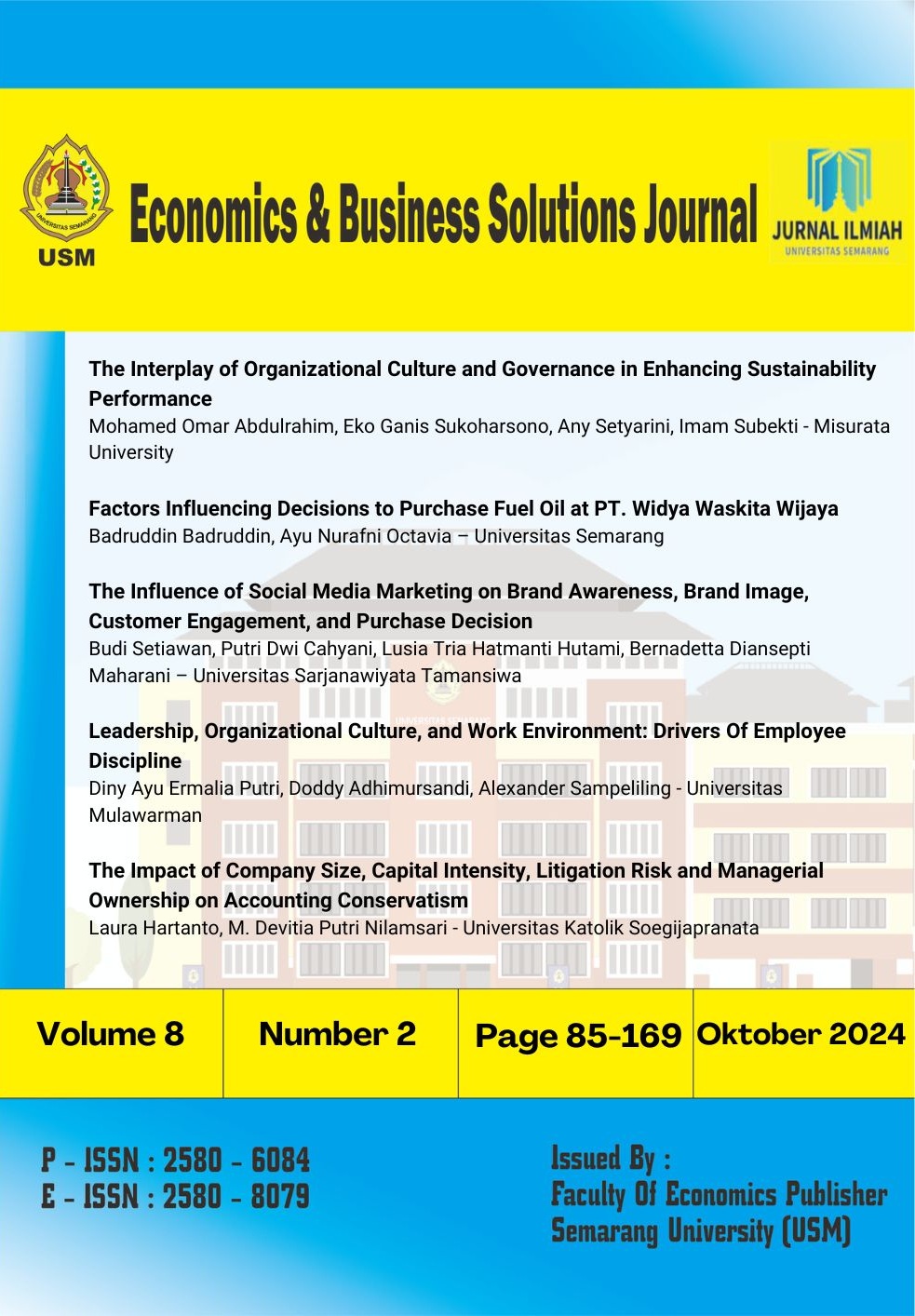Leadership, Organizational Culture, and Work Environment: Drivers Of Employee Discipline
DOI:
https://doi.org/10.26623/ebsj.v8i2.10332Keywords:
Leadership Style, Organizational Culture, Work Environment, Work DisciplineAbstract
Leadership style, organizational culture, and work environment are crucial factors influencing employees' work discipline. This study investigates these factors' impact on employees' work discipline in the Secretariat Section of the Public Works Department, Kutai Kartanegara Regency, Indonesia. The research employed a quantitative approach with a sample of 75 respondents using the census method for sampling. Data analysis was performed using SEM with SmartPLS Version 4. The findings indicate that leadership style has a positive, although statistically negligible, impact on work discipline. On the other hand, both organizational culture and work environment have positive and statistically significant impacts on work discipline. This study emphasizes proficient leadership, robust corporate culture, and a conducive work environment to foster employee discipline. The findings suggest that organizations should develop participatory and employee-oriented leadership styles, foster a culture of innovation and teamwork, and provide a conducive physical and non-physical work environment to enhance employee discipline and overall organizational performance. This study enhances the comprehension of the variables influencing work discipline in public sector organizations. It provides practical implications for managers and policymakers in designing strategies to improve employee discipline and organizational effectivenessReferences
Anansi, S. N. (2020). Perceived influence of work relationship, workload, and physical work environment on job satisfaction of librarians in South-West, Nigeria. Global Knowledge, Memory and Communication, Vol. 69(6–7), 377–398.
Anna, C., Bos-Nehles., Keith, Townsend., Kenneth, Cafferkey., Jordi, Trullen. (2023). Examining the Ability, Motivation and Opportunity (AMO) framework in HRM research: Conceptualization, measurement and interactions. International Journal of Management Reviews, doi: 10.1111/ijmr.12332
Aziz, A., Purwana, D., & Sudiardhita, I. (2021). Leadership style and work environment influence soldier performance with work discipline as an intervening variable (case study on Eskorta ship unit command fleet ii). Jurnal Dinamika Manajemen Dan Bisnis, 3(2), 37-57. https://doi.org/10.21009/jdbm.03.2.3
Botelho, C. (2020). The influence of organizational culture and HRM on building innovative capability. International Journal of Productivity and Performance Management, Vol. 69(7), 1373–1393.
Budirianti, B. L. R., Agusdin, A., & Surati, S. (2020). The Influence of Work Discipline, Motivation, Job Satisfaction and the Work Environment on the Performance of Contract Employees. International Journal of Multicultural and Multireligious Understanding, Vol. 7(11), 174.
Cindy, Yunhsin, Chou., Yung-Cheng, Shen., Po-Han, Wu., Heng, Yu, Lin. (2022). Employee perceived meaning of work and service adaptive behaviour: a psychological resourcefulness perspective. Service Business, doi: 10.1007/s11628-022-00505-9
Dewi, A. F., Sari, P., & Pohan, Y. A. (2023). Pengaruh Kepemimpinan Dan Lingkungan Kerja Terhadap Loyalitas Kerja Pegawai di Dompet Dhuafa Waspada. Vol. 5(1).
Diego, Vazquez-Brust., Charbel, José, Chiappetta, Jabbour., José, Antonio, Plaza-Úbeda., Miguel, Pérez-Valls., Ana, Beatriz, Lopes, de, Sousa, Jabbour., Douglas, W.S., Renwick. (2022). The role of green human resource management in translating greening pressures into environmental protection practices. Business Strategy and The Environment, doi: 10.1002/bse.3319
Emmelie, Hazelzet., Inge, Houkes., Hans, Bosma., Angelique, de, Rijk. (2022). How a steeper organizational hierarchy prevents change—adopting and implementing a sustainable employability intervention for employees in low-skilled jobs: a qualitative study. BMC Public Health, doi: 10.1186/s12889-022-14754-w
Farhana, Ferdousi., Nur, Hanani, Zainal, Abedin. (2023). Strategic Human Resources Management for Creating Shared Value in Social Business Organizations. Sustainability, doi: 10.3390/su15043703
Ghozali, H. I. & L. (2014). Partial Least Squares Konsep, Teknik, dan Aplikasi Menggunakan Program SmartPLS 3.0 Untuk Penelitian Empiris. Badan Penerbit Universitas Diponegoro.
Hadiyatno, D. (2021). The role of organizational culture in implementing improvements in general administrative officer performance of regional secretariat North Paser district. International Journal of Educational Research & Social Sciences, 2(4), 657-665. https://doi.org/10.51601/ijersc.v2i4.91
Hair, J. F., Hult, G. T. M., Ringle, C. M., and Sarstedt, M. (2021). A primer on partial least squares structural equation modelling (PLS-SEM). China: Sage Publications.
Kadir, I. (2023). Literature review determination productivity and performance: discipline work and organizational culture. International Journal of Advanced Multidisciplinary, 2(1), 168–176. https://doi.org/10.38035/ijam.v2i1.250
Kurniawati, N., Djamil, M., & Saluy, A. B. (2021). The Influence Of Organizational Culture, Competence On Patient Safety With Work Discipline As Intervening Variables In RS. Ypk Mandiri. Vol. 2(4).
Marx, T. G. (2015). The impact of business strategy on leadership. Journal of Strategy and Management, Vol. 8(2), 110–126.
Mayori, E. (2023). The influence of leadership style and work discipline on the performance of Makassar City Education Office employees. Marginal Journal of Management Accounting General Finance and International Economic Issues, 2(4), 944–950. https://doi.org/10.55047/marginal.v2i4.789
Novianti, D. (2024). The influence of leadership style, work discipline and non-physical work environment on the performance of employees. Journal of Social Science, 5(3), 865–869. https://doi.org/10.46799/jss.v5i3.828
Pawirosumarto, S., Sarjana, P. K., & Muchtar, M. (2017). Factors affecting employee performance of PT.Kiyokuni Indonesia. International Journal of Law and Management, Vol. 59(4), 602–614.
Pimpong, M. (2023). Work Environmental Factors and its Impact on Employee Productivity: The Mediating Role of Employee Commitment. E-Journal of Humanities, Arts and Social Sciences, pp. 916–935. https://doi.org/10.38159/ehass.2023482
Rahmawati, E. (2023). Effect of work discipline and organizational culture on employee performance. Majalah Bisnis & Iptek, 16(2). https://doi.org/10.55208/bistek.v16i2.450
Ramaditya, M. (2021). Does discipline and work coordination can improve employee performance through leadership style as intervening variables? (evidence from public companies in indonesia).. https://doi.org/10.4108/eai.9-10-2020.2304787
Ratnasari, S., Sutjahjo, G., & Yana, D. (2019). Leadership style, work discipline, compensation, and employee performance are measured through employee motivation at the bank Syariah X branch batam. Etikonomi, 18(1). https://doi.org/10.15408/etk.v18i1.6752
Rayhan Adhitya, W., Kurnia Afiandi, D., Lubis, N., Program, D., Manajemen, S., Ekonomi, F., Bisnis, D., Utama, U. P., Program, M., Potensi Utama, U., & Yos, J. K. L. (2021). Pengaruh Gaya Kepemimpinan, Lingkungan Kerja, Dan Budaya Organisasi Terhadap Disiplin Kerja Karyawan Pada PT. Bank Sumut Cabang Sukaramai. 28. Accumulated Journal, Vol. 3(1).
Sirajuddin, S. (2023). The influence of leadership style and organizational culture on the performance of employees through work discipline in the electrical industry. Journal Industrial Services, 9(2), 217. https://doi.org/10.36055/jiss.v9i2.21878
Downloads
Published
Issue
Section
License
The journal holds the copyright for each article published with work licensed simultaneously under a Creative Commons Attribution 4.0 International License, which allows others to share the work with an acknowledgment of the authorship and early publication of the work in this journal.







